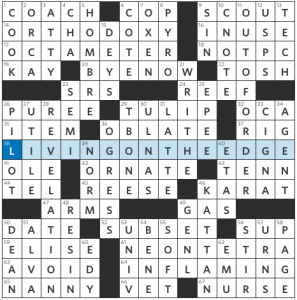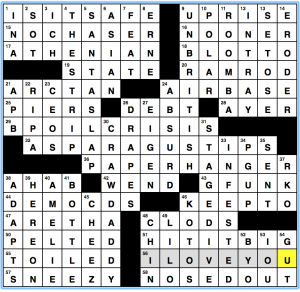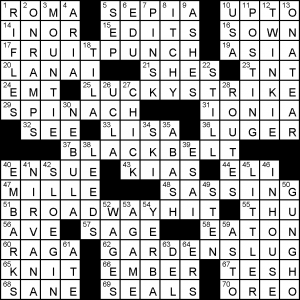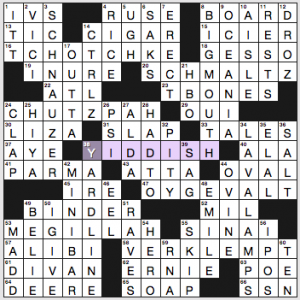 (3.34 avg; 22 ratings) rate it
(3.34 avg; 22 ratings) rate it
 (3.35 avg; 13 ratings) rate it
(3.35 avg; 13 ratings) rate it
Scot Ober & Jeff Chen’s New York Times crossword—Amy’s write-up
Who doesn’t love YIDDISH? It’s a delightful language with lots of colorful vocabulary that there’s no precise English equivalent to. Like kvell. “Bursting with pride” is a much more complicated construction than just that simple Yiddish verb. Here are the vocab tidbits:
- 16a. [Knickknack], TCHOTCHKE.
- 20a. [Excessive sentimentality], SCHMALTZ. Also chicken fat.
- 24a. [Shameless audacity], CHUTZPAH.
- 47a. [“Jeez!”], “OY GEVALT!”
- 53a. [Long, involved account], MEGILLAH.
- 58a. [Choked up with emotion], VERKLEMPT.
I’m a little surprised this was deemed to be a Wednesday puzzle rather than a simple Tuesday. There’s no trickery at all, just familiarity with Yiddish terms that have pretty much made it into English.
Five more things:
- 62a. [Naïvely optimistic Muppet], ERNIE. A gay man who wrote various Bert and Ernie scripts now says he riffed on his own relationship and considered them to be a gay couple. Sesame Workshop played the wet blanket by insisting that they’re sexless puppets who are just friends.
- 3d. [Dog with a bearded muzzle], SCHNAUZER. Not a Yiddish word! It just sounds like one. “Oy gevalt, he is such a schnauzer!” SCHNAUZER, BIG MOUTH, and LAVA LAMPS are my favorite entries here, aside from the Yiddishisms.
- 12d. [Physician who was once a regular on “The Oprah Winfrey Show”], DR. OZ. Ah, yes. Back when he still had some credibility, before he whored himself out to questionable supplements and non-science.
- 14d. [“Undo” shortcut in Microsoft Word], CTRL-Z. Control-Z. Undo, undo!
- 60d. [Half a score … or a perfect score], TEN. As in 10 being half of 20, a score, as well as being a perfect 10/10 score in whatever events are still using a scoring system of 0-10.
Four stars from me.
Andrew J. Ries’s Wall Street Journal crossword, “Border Lines” — Jim’s review
Our theme is LIVING ON THE EDGE [Taking risks, or, in another sense, a description of this puzzle’s theme]. The perimeter of the grid consists of occupational titles, though they aren’t clued that way.
Proceeding clockwise from the NW:

WSJ – Wed, 9.19.18 – “Border Lines” by Andrew J. Ries
- 1a [Plane section] COACH
- 6a [Swipe] COP. Ironic and uncommon definition for this short word.
- 9a [“To Kill A Mockingbird” narrator] SCOUT
- 13d [Georgia ___] TECH. Slightly off (but still acceptable) in that the job is a TECHnician and the school is officially the Georgia Institute of TECHnology.
- 34d [Chemical substance] AGENT
- 58d [Sheaf unit] PAGE. Can one make a living as a PAGE? My impression is that this is a job for one just starting out to learn the ropes.
- 67a [Enjoy slowly, as a beverage] NURSE. How did this word come to be? Is that what nurses are doing at the nurses’ station when no one is looking?
- 66a [Give a careful examination, say] VET
- 65a [Farm female] NANNY
- 50d [“Giant” star] DEAN. That’s James DEAN.
- 26d [Range light] PILOT
- 1d [Apple head Tim] COOK
I enjoyed this solve. For a while I was trying to figure out the connection between ORTHODOXY, OCTAMETER, and NEON TETRA (answer: there is none because they’re not thematic). The revealer is perfect and also crosses two themers. Nice.
There’s a lot of theme material here, and I’m sure it put a lot of constraints on the grid. But Andrew is a pro, and he still gave us good stuff like OUT OF ORDER, REVELATION, OBLATE, ORNATE, “BYE, NOW,” and the aforementioned long entries. So I’m willing to look past UTILE, OCA, and DEYS [Old Algerian rulers].
I had trouble in the SE with 46d [Chris of TV’s “The Middle”], 52a [Primes, in relation to natural numbers, e.g.], and 64a [Provoking]. I thought the math clue was comparative, so I plunked in an -ER at the end, but now fully reading the clue, I see it wants a noun. Other tricky bits down there: As far as I knew, [Gilder’s unit] could’ve meant CARAT or KARAT, and since it was crossing a proper noun at the letter in question, I’m sure that was sticky for other people as well. And [Like a buyer’s market] is a tough clue for SOFT. In total, that corner gave me as much trouble as the rest of the grid put together. I finally saw INFLAMING and that broke it open for me.
Solid, theme-filled grid. 3.6 stars.
Kameron Austin Collins’ AVCX, “AVCX Themeless #30” — Ben’s Review

It’s a themeless week over at the AVCX, with a puzzle from KAC that feels just a little…off, compared to his usual output. I’ve been spoiled by so many good puzzles from Kameron (both at the AVCX and now at the New Yorker) that today’s entry feels minor by comparison. The grid itself is fine, but feels like it’s missing his typical beauty, and the fill feels similarly askew from his typical level of accessibility.
Things I liked: NOONER clued as “Midday play?”, RAMROD, BP OIL CRISIS, ASPARAGUS TIPS (“Points d’Amour”, it turns out), SANTA’S LAP, ROOMBA, AMELIE, CHEEZ
Things that frustrated me: Lots of fill that skewed a skosh obscure this week — the director of Suicide Squad (AYER), UNBRITISH, SETOSE (“Bristly, from the Latin”), Manfred EIGEN (1967 Chemistry Nobelist), PG UP
3.5/5 stars.
Kurt Mengel & Jan-Michele Gianette’s LA Times crossword – Gareth’s write-up

LA Times
180919
A stealth theme! Today we have five synonyms for “assault (with the hands)” at the end of long across answers: FRUITPUNCH, LUCKYSTRIKE, BLACKBELT, BROADWAYHIT and GARDENSLUG. It’s a theme that’s been done before and will be visited again. I appreciated that all the answers use their synonym in nonviolent ways.
Most puzzling moment: When I wanted both MINSK and SEPIA. I bet I wasn’t the only one that forgot that along with the much larger MINSK there is a city in Belarus called PINSK. That’s a Eastern European geography deep cut all right!
There was also some high-falutin’ Italian references. We often get [Italia] references in ROMA clues, but today, [città] was thrown in for good measure. Worth noting for future clues. [Ingredient in a Florentine dish], SPINACH – is that chicken Florentine? I was wholly unfamiliar with the dish referenced in [Saltimbocca herb], SAGE. Apparently it’s marinated veal wrapped in sage and prosciutto. Getting cooking schooling tonight! I have tried making several dishes that have appeared in crossword, but I don’t think the (almost) missus will go for either Chicken Florentine (doesn’t touch spinach) or Saltimbocca. I will have to stick to tomorrow’s meal plan of Beef Stroganoff with rice.
The other complete unknown for me was [Chef Jet __, frequent “Cutthroat Kitchen” judge], TILA. Never heard of the show, which must be jumping on the Masterchef / Iron Chef / Top Chef bandwagon?
From the “you don’t need to be a multiword entry to shine” file: NEBULA, NIRVANA, INHOUSE, GUNGHO.
3 Stars
Gareth

I’ve been going back in time doing nyt xwords from the archives. I recently did Aug 23 2012 — it had a similar theme: “Learning Yiddish”
NYT: I love the overall positive, or perhaps evenhanded is the right term, that this blog has over Rex Parker’s. He did not care for this puzzle, grousing that a list of terms is not a theme, and calls it out for being “dumb.” Which … sigh. Reductive name-calling isn’t justified when something doesn’t meet your high standards, and I know it’s his thing. It’s just the same sour note struck again and again.
FWIW, I liked this one.
I liked it, too. I love words, and am always glad to have the chance to improve my relationship with them.
The puzzle brought back memories of being the Storytime reader at the bookstore where I worked, and one day picking up a Yiddish picture dictionary to share; the children and I picked out words to say. The parents and children all loved it; Yiddish words have great mouth feel. It was a diverse, multilingual group of families who could all relate to the feelings that those words evoked.
NYT: How is “tic” part of XXX?
tic tac toe
NYT: I loved this puzzle. I love Yiddish. People crack up when I use it, because of my accent (which is not yiddish). It’s the opposite of bland and I’m all for that.
Don’t see the theme on the WSJ puzzle. How are these occupations “living on the edge?”
If you loved this puzzle, run don’t walk to the bookstore (or Amazon) and get a copy of Michael Wex’s book Born to Kvetch (full disclosure: I published it a long long time ago).
It’s fascinating and hilarious, and looks at how Yiddish was an amazingly subversive language of the oppressed in a land in which they would always be the Other to their neighbors. I can guarantee multiple laugh-out-loud moments.
as should be obvious, I loved this puzzle. I assume it’s a Wednesday, because some of these terms may be unfamiliar to readers from parts of the country without large Jewish populations. But what do I know? oy.
My favorite Yiddishism that’s not in here is “ungapatchke” which means overdone, a mishmash
I also loved this puzzle, primarily because of MEGILLAH, which I did not realize was Yiddish. I have often wondered if the wealth of great Jewish comedy writers is a byproduct in part of the Yiddish language.
And to repeat something I have said before, my all-time favorite post here or in the NYT Forum was Martin’s explanation of the various terms for pests, losers and annoying people: schlimiel, schlimazel, schmendrick, nudnik, et al.
Steve
It’s Hebrew and Biblical, like the MEGILLAH of Esther, but borrowed into Yiddish.
Thank you.
I have been laughing at myself all day because, while I have used the phrase “the whole Megillah,” if you had asked me to spell it, I would have thought Magilla, as in the gorilla.
I was unfamiliar with OY GEVALT, but knew and have used the others.
Steve
schlimiel, schlimazel, schmendrick, nudnik…the art of being dismissive :)
sometimes, it’s critical to mental health.
Amy – today is Yom Kippur.
I’m gonna have to side with Rex on this one, but our reasons may be different. As a person who is not familiar with any of these phrases (except for CHUTZPAH), this puzzle offered me zero fun. The revealer wasn’t anything special: It literally just said “there are six Yiddish words in this puzzle.” And the crosses were not the best for some of them, the clues felt stale… I don’t know, maybe it’s just that seeing Dr. Oz in a puzzle takes away all my joy.
Puzzle’s problematic if you don’t know the Yiddish.
I knew all but one (OYGEVALT), despite living in another country where these Yiddish phrases aren’t necessarily in use (there are some Yiddish phrases in South African English, but they don’t necessarily mean the same thing; e.g. a kugel is roughly analogous to Jewish Princess, not a baked good, here.) They have so thoroughly permeated American cultural works for example that it’s hard to imagine many people wouldn’t be familiar with most to all, particularly thosed based in New York itself.
Ben and I obviously have different definitions of accessibility or just different knowledge sets. I usually find KAC’s puzzles baffling, but today’s AV Club was delightful. Not that there wasn’t stuff I didn’t know, but there was always a lifeline. GFUNK? Any letter would’ve worked for me, but STAGE DIVE was logical enough. CRAWDADDY? No idea; we always just called ’em crawdads, but the lower left had to be SLEEPY or SNEEZY — and I’m embarrassed at how long it took me to see ARETHA in that rather trying SW sector. Wonderful puzzle.
Amen to delightful. 47A, 16A, 5D, 31D – great misdirect and punny clues.
AVCX: the clue for STAGE DIVE should be shortlisted for clue of the year at the Orcas! I absolutely beamed when I got that one.
Overall, this KAC offering was a mixed bag—the inspired stuff was supremely inspired, but the weaknesses were glaring. Loved the aforementioned clue, as well as much of the medium-length fill—and of course, ASPARAGUS TIPS, clued with a term I didn’t know but instantly loved. On the other hand, BP OIL CRISIS feels made up. No, obviously there was a famous crisis in 2010 involving BP and oil, nobody questions that, but nobody called it the “BP oil crisis.” They called it the “Deepwater Horizon disaster,” or some variation on that phrase. So the _event_ is a famous thing but the term in the puzzle was made up. The other big flaw I see in the puzzle is the unfortunate crossing of SETOSE and AYER at a vowel. Not ideal, especially by KAC’s usual standards.